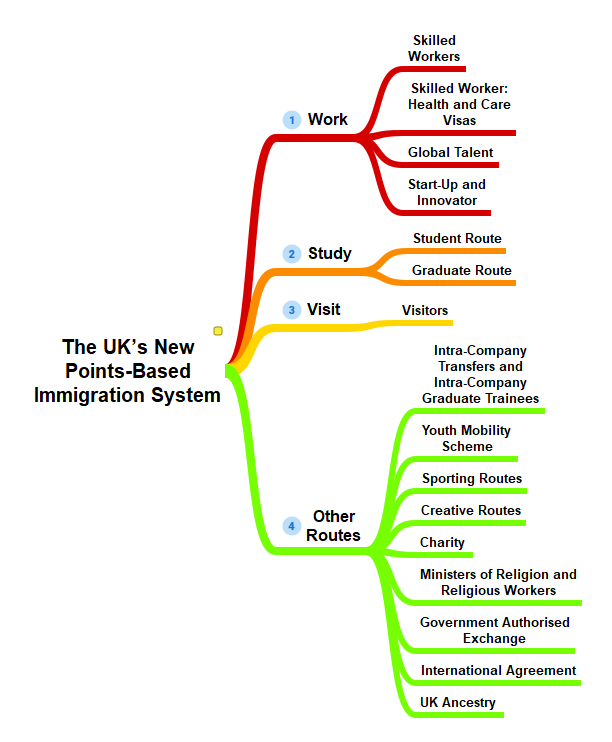Main Principles of the UK’s New Points-Based Immigration Routes: This article is a part of the UK’s New Points-Based Immigration System’ article/video series. Here is I’ll cover in this article/video series:

The easiest way to get access to all the articles and the videos, which were already created is to go to THIS PAGE. It is entirely free, and the information will be with you within a few seconds.
The UK’s New Points-Based Immigration Routes: Sponsorship
Certain new and existing UK’s New Points-Based Immigration routes will need to have ‘sponsors’. This requirement will apply to:
- the Skilled Worker routes;
- the Health and Care routes;
- the student route; and
- some specialised worker routes.
Although specific requirements will vary, the general idea behind Immigration sponsorship is to ensure that the sponsors prove their credibility to the Home Office.
They will need to undergo certain checks to determine genuineness, solvency, role, salary and skills appropriateness and credibility.
Once they’ve proven this, they’ll get a license from the Home Office. They’ll need to pay a fee for this. Some sponsors will also need to pay Immigration Skills Charge. It is to ensure that their mission benefits and is conducive to the wider public good.
All senior personnel and key users who are part of the sponsorship programme will need to undergo criminality and other security checks.
It will directly affect the sponsors, which are educational institutions. They’ll need to:
- hold educational oversight
- meet an annual Basic Compliance Assessment. When the Home Office carries out a Basic Compliance Assessment, it will assess the Sponsor against the core requirements. The core requirements are that the Sponsor needs to have:
- a visa refusal rate of less than 10%
- an enrolment rate of at least 90%; and
- a course completion rate of at least 85%
- undergo additional scrutiny if they wish to teach children.
Radical Changes to the Current Sponsorship Process

The Home Office has introduced many radical changes to its current Sponsorship process. They intend to make the process more efficient and effective by employing faster or simpler working methods. Most importantly, the new sponsorship process will help the Sponsors to bring the migrants much faster.
The Home Office will suspend the cap on Tier 2 (General) applications. Tier 2 (General) is the route of non-British citizen skilled workers to enter the UK.
Also, the UKVI will remove the Resident Labour Market Test. These two measures alone should reduce the application process by up to eight weeks in comparisons to the process, which existed before.
Sponsor Licences for the New Skilled Worker Route
It is vital to begin by saying that Existing Tier 2 (General) and Tier 2 (Intra-Company Transfer) sponsors will automatically get a new Skilled Worker licence or Intra-Company Transfer licence from the Home Office. Their licences will expire when their current licences expire. The UKVI will get them the relevant number of Certificates of Sponsorship.
Secondly, under the new system, the new Skilled Worker Route Sponsors will not be concerned with meeting the Resident Labour Market Test. It means that they can deduct at least four weeks from the application process.
Instead, the Sponsor will need to prove to the Home Office that the vacancy for the migration is a genuine one. Also that they will pay the appropriate salary and it will meet the necessary skill test. It is to ensure that the sponsors do not create jobs solely to help a specific person to enter the UK.
Thirdly, the Sponsors will need to pay the Immigration Skills Charge, unless exemptions apply. The fees £1,000 per worker for the first 12 months. Then it will be £500 for each subsequent six-month period. Charities and Small and Medium Enterprises will need to pay only £364 per worker per year. There will be no difference in fees for EU and non-EU workers.
English Language Requirements
You’ll find these requirements in almost every UK’s New Points-Based Immigration route. However, the level may vary. For examples, the degree level students will need to have the ability to speak English at the level of at least B2 of the Common European Framework of Reference, which is A-level equivalent. It will be a slightly lower level for skilled workers: B1 (AS-Level equivalent).
Also, the Home Office will be slightly more flexible in allowing the migrants to meet the English language requirement.
For example, doctors, dentist, nurses or midwives can get a confirmation from their professional bodies that they can speak at the appropriate level.
Also, the UKVI will extend the list of majority English speaking countries to include Ireland and Malta.
Dependants
There will be no change in respect of dependants. Partners and dependants children under 18 of skilled workers and postgraduate students can still accompany their relatives to the UK. They can work full-time and children can access state education. They will need to pay the Immigration Health Surcharge.
The Home Office includes civil and unmarried partners into its definition of ‘partners’.
Switching

Switching is a legal term, which allows migrants to change their immigration categories when already in the UK. The majority of the UK’s New Points-Based Immigration routes will allow this switching. Unsurprisingly, those who want to switch will need to demonstrate that they meet all the requirements for the new immigration route.
Also, as before, those who are on short-term routes in the UK (for example, visitors and seasonal workers) will not be allowed to switch.
Criminality and Deportation
After 31 December 2020, the EU citizens and non-EU citizen will become completely equal as far as the criminality and deportation rules are concerned.
As was the case with all visa-national migrants before, now the Home Office will apply the rules equally to EU and non-EU citizen and will refuse visa applications if a person:
- a has a conviction with a custodial sentence length of at least 12 months;
- committed an offence which caused serious harm;
- is a persistent offender who shows a particular disregard for the law;
If a person is already in the UK and they were convicted fore than 12 months they are most likely to be deported from the UK. If their sentence is for less than 12 months, the UK immigration authorities can still deport them if it is conducive to the public good, including where they have serious or persistent criminality.
Also, where their character, conduct or associations means their presence is not conducive to the public good.
